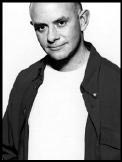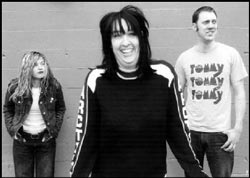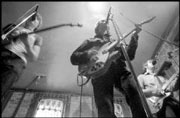NICK HORNBY, THE AUTHOR of the music geek meisterwork High Fidelity—as well as more recent efforts like About a Boy and How to Be Good—has made a career of exploring the ways in which pop culture can serve as both a defining force and salvation.
His latest title, Songbook (McSweeney’s Books, $26), a collection of essays on 31 of his favorite pop tunes—from Nelly Furtado to Led Zeppelin, Bob Dylan to Paul Westerberg—is quintessentially Hornby: an idiosyncratic and charming exploration of the meaning of music and how it changes as we grow up and grow old. (For Hornby, it’s also an intensely personal account, as music has proved a critical means of communication with his autistic son.) Last week, the London-based Hornby spoke about the genesis of Songbook, the process of adapting novels for the screen (he’s currently working on the screenplay for Dave Eggers’ A Heartbreaking Work of Staggering Genius), and how Hollywood has handled his work.
Seattle Weekly: How did Songbook come about?
Nick Hornby: I’d been doing some film stuff, and I was getting fed up waiting for people—there’s a lot of waiting around in film—so I started writing these little essays. I had been doing stuff for The New Yorker, and it helped me to understand other ways I wanted to write about music. I guess this book came out of wanting to do something, but wanting to do it on my own terms.
You’re someone who’s famously identified with making lists of favorite things. Is Songbook your definitive list of music?
No. If I’d thought about it properly, I probably wouldn’t have done it at all. As a consequence, the list of songs—especially as it’s been reported [in England]—seems much more significant than it was meant to be. The choice of songs was pretty whimsical, really. If I wrote the book today, it would probably be 31 different songs.
Is it difficult writing about music for an audience with varying degrees of knowledge on the subject?
It was interesting when I wrote High Fidelity, because some things that were meant to be funny really didn’t play as being funny to music fans. It was quite interesting to me, then, that my mum stood a better chance of getting some of the jokes than somebody who knew the name of every single artist I listed. Sometimes it’s a bit too close to home and people can’t see the humor in the situation if they do know too much about music. So now it’s sort of built-in that I do recognize my [work] is going to mean different things to different people.
Songbook is—perhaps unintentionally—heavily autobiographical. Did it ever become uncomfortable?
I’m reasonably comfortable with the level at which I reveal myself. It cuts off at the point where things become really personal—like stuff about my leather fetish. [Laughs] That was a joke. I mean, people know about my son. And my divorce was in the paper. The difficult thing is that you always have more of yourself revealed than you want to by the process of doing something that’s in the public eye.
You write that you’re not that big a Neil Young fan, but he also has a child with a severe disability and he made a record [1983’s Trans] about the difficulty of communicating with him. In light of your own situation, have you revisited that album?
No, I haven’t, but I think about Neil Young often in that regard—in terms of the communication through music. Things with my [son] shift all the time—one day it seems possible to communicate in a certain way, and then the next day the barriers come down and something else is open. Autism’s a difficult condition in that way; no two kids are the same, and no prognosis makes terribly much sense for long. But, yeah, you are curious about people who are in roughly the same situation as you.
You’re adapting Dave Eggers’ memoir right now. And you’ve had a lot of your own work adapted fairly successfully. What’s it like being on the other side of that situation?
I’ve really enjoyed the process of all of them. I’ve had a very happy experience—mostly with High Fidelity and About a Boy—because I didn’t get involved. I think it can be a pretty heartbreaking thing. . . .
You hear all the Hollywood horror stories from writers who’ve had their stuff completely mutated . . .
But you know that they’re going to get mutated. And if you don’t want them to get mutated, then don’t take the money. [Laughs] I think the real problems start when you think you can control things.
With High Fidelity, I was interested with the first draft, but by the time you get the third one and the eighth one, you’ve really forgotten what the last one is like. At that point, you just think, ‘Well go on, get on with it. I’ll just go and see the movie when it comes out.’ And I’ve been much happier that way.









